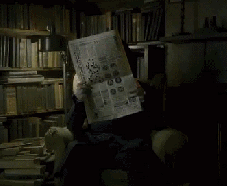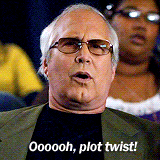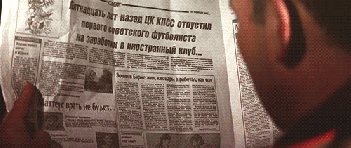 (Before I dive in: see that adorable avatar to the left there? I had it commissioned by artist Charlavail, and I’m so obsessed with it that I decided to make it a permanent fixture in my blog posts. You should see it at the top of my posts from now on!)
(Before I dive in: see that adorable avatar to the left there? I had it commissioned by artist Charlavail, and I’m so obsessed with it that I decided to make it a permanent fixture in my blog posts. You should see it at the top of my posts from now on!)
To state the obvious: our country is facing a crisis. If you’ve been paying attention, you know that a month into #45’s presidency (I refuse to say his name here), laws and human rights have been violated. The travel ban applied to many Muslim-majority countries resulted in thousands of people, many of them legal American citizens, being detained in airports across the country in January, many of them children separated from their parents and/or guardians. #45’s administration has been caught in a variety of lies, lies they’ve had the gall to call “alternative facts.” Just days ago, it came out that Trump’s campaign aides had contacts with Russian intelligence and that this has been repeatedly lied about, which is potentially treasonous. The list goes on and on.
In response to all this, #45 has been lashing out at the media. Anytime a news source so much as criticizes #45–whether they’re pointing out his alarming behavior or simply reporting things he has done without adopting a tone of complete support for the president–#45 and his backers cry “fake news!” Using Twitter or press conferences or a combination, he tears down esteemed and reliable sources such as The New York Times, CBS, and The Washington Post in an effort to delegitimize their publications and present himself in nothing but a positive light. In his mind, being President of the United States means U.S. journalists owe it to him to portray him favorably. He thinks they should serve his interests rather than the interests of the people. He values blind support over truth.
This all sounds very familiar to me. And I’m not talking about Nazi Germany or other fascist regimes. I’m talking about something much smaller, and much more personal to me. Smaller, but still important, as it bears parallels to larger issues in the world today.
Buckle up, because this is a long, juicy story.

I received my bachelor’s degree from the University of Redlands. While there, I became involved with the student newspaper, The Bulldog Weekly, first as a writer, then as a section editor, and eventually as one of two co-editors-in-chief. Everyone on the staff was paid. It was funded by the student government, meaning, essentially, it was funded by the school itself. But the administration usually left us alone. Co-editors-in-chief were selected by the newspaper’s committee, made up of a variety of students, administrators, faculty, etc., and from there, the co-editors got to select their own staff. The only non-student regularly guiding us was a veteran journalist the university hired to provide journalistic insight and advice, and to assist us with edits. Other than that, we students did everything ourselves. We held meetings. We assigned stories. We let our writers and editors know ways they could improve and encouraged them when they did well. Everything ran fairly smoothly.
Then in my senior year, the fall semester of 2014, a pair of wealthy benefactors donated a large sum of money to the school. It was meant to be used for a new scholarship, one that would reward students who presented “exceptional achievement in leadership, civic engagement, academic excellence, entrepreneurial spirit, and community service.” Naturally, The Bulldog Weekly covered it.
It all started with a quote from a student.
We assigned a writer to tackle the front-page story, one who happened to be a friend of mine–it’s a small school, so students tend to end up working with their friends. She’d been paying attention to gossip around the university regarding the scholarship and noticed that many were critical of it. Specifically, people took issue with the phrase “entrepreneurial spirit,” because they felt this was code for “rich white men.” That’s the image that springs to mind when you think “entrepreneur,” isn’t it? Women and people of color are rarely awarded this same title. They’re typically called something else.
The writer mentioned these perspectives to the journalistic advisor. It is crucial to note that our journalistic advisor was a black woman, one who’d spent (and continues to spend) years writing about black activism and black experiences. When our writer told the advisor about the scholarship whispers going on around school, the advisor urged the writer to include this angle in the article, especially if so many people were feeling this way. Getting a feel for how the people are reacting to something is good journalism.
The writer started collecting a balanced set of quotes–some from students who were critical of the scholarship, some from those who liked the idea, and some from those who felt mixed. The closest our writer came to getting a quote that matched the whispers she’d been hearing was, “The scholarship is targeted at a very specific group.”

During the first round of edits, the advisor flagged the quote and noted (paraphrased), “What specific group? The rich white men? If that’s the case, get that angle.”
The writer returned to the person she’d obtained the quote from. Now, here’s where our writer made a mistake: the way she clarified what the person meant was unethical, journalistically speaking. What she should have done was ask the person, “What very specific group did you mean here?” Instead, she asked, “Which group did you mean here? Rich white men?”
The person who provided the quote–who is white themself–replied, yes, that is the group they meant. When asked later, they stood by this opinion. Part of the reason the writer made this mistake may have been because she knew this person well, and knew how critical they tend to be of the white patriarchy. The October story ran with this final quote: “The scholarship is targeted at a very specific group–rich, white males–and it’s all for incoming freshmen.”
Two weeks later, after the newspapers with the scholarship story had been distributed around the school, I got a call from the writer. “The newspapers are missing from the Commons,” she told me, referring to the campus dining hall.
“What?” I asked.
“They’re gone. I think someone removed them.”
It turned out someone had removed the newspapers from several areas around school. A university administrator, the vice president of the school overall, knew that one of the benefactors who’d donated the money for the scholarship would be visiting campus that day. Upon seeing the newspaper’s criticism that the scholarship seemed geared toward “rich, white males,” she apparently panicked and called the student body president, who was a current student and a senior at the school. She asked him to remove the newspapers because she didn’t want the benefactor seeing them. He did what she asked.
Hm. Did the university have a problem with a student’s critical perspective? Did it think the newspaper served as its mouthpiece rather than a collection of objective reports, even though this is not how journalism is meant to work? Sounds familiar.
Soon afterwards, the student body president asked for a meeting with the writer regarding her article, with an administrator also present. Note that the writer and the student body president had been friends since freshman year. Regardless of that, this meeting was highly inappropriate–if the student body president had concerns about the newspaper, it made sense to contact my co-editor and/or me about it, not the writer directly. I advised her to decline the meeting and to direct him to my co-editor and me. He continued to badger her. After much push and pull, he and the administrator finally agreed to meet with my co-editor and me instead.
During the meeting, the president and administrator said they understood the “rich, white males” quote had been fabricated. My co-editor and I corrected them: it was true that the quote had been fed, which was not okay, but the person stood by their quote. A fabricated quote and a fed quote are two very different things. We apologized for the method used to obtain the clarification and promised to talk it over with our writer. It was hardly necessary at this point–she already understood the seriousness of the error–but we did it, anyway.
The president then showed us a printout of the edits our journalistic advisor sent to the writer asking her to clarify what was meant by “very specific group.” He’d talked our writer–his friend–into giving it to him. He and the administrator seemed to think the advisor may have planted the “rich, white men” idea in our white writer’s head.
Yes–they implied that our advisor, a black woman, was pushing some anti-white agenda on the newspaper.
My co-editor (who is also a black woman) and I explained that this was not the case, and that the reference to “rich, white men” came from an earlier conversation between the writer and advisor. The meeting ended, and I thought that was the end of the issue.
But there was still tension. During a later phone conversation, the writer confessed to me something the student body president had said to her before the meeting with him (remember that the student government was in charge of the newspaper’s budget). He’d said, “It’s my money. I could cut the newspaper’s funding if I really wanted to.”
Here’s an important detail I haven’t mentioned yet: the student body president was my ex-boyfriend.

We were not on unfriendly terms, but we weren’t exactly buddy-buddy with each other, either. He’d broken up with me two summers before, and we’d been friendly during the school year after that. But during my senior year, he stopped talking to me, for the most part. His lack of interest in speaking to me seemed to coincide with him realizing I was dating someone else (my current fiancé). I didn’t want to assume the worst of him, though. I wrote it off as him being too busy with presidential duties to socialize much, and I was fine with letting him fade into the background while I went about my life.
I didn’t think too hard about the fact that he controlled the budget of the newspaper I co-ran–the newspaper he knew was important to me. I didn’t think hard about it because I thought, well, we had a history, but he was a decent person. He wouldn’t abuse his power. He’d assured me the year before that he wanted The Bulldog Weekly to succeed, and that he’d back me up in any way he could.
The semester progressed. December grew near, which meant The Bulldog Weekly would meet for its regular end-of-the-semester check-in meeting. I said before that the committee consisted of administrators and students. One administrator was the vice president who demanded that the newspapers be removed from the Commons, and another was part of that meeting with the student body president. The student body president himself was also on the committee, along with me, my co-editor, our advisor, and several professors.
Here’s where it gets shittier.
An e-mail was sent out asking about availability for meeting times. Our journalistic advisor hadn’t been CC’d on the e-mail. When one professor pointed out the oversight, she was told that our advisor wasn’t invited.
Obviously, this wasn’t good. Something was up. Several strongly worded e-mails were exchanged, asking that the advisor be permitted to attend, as it only made sense to have her there. We prepared ourselves for a tough meeting. The administrators in charge finally agreed to have the advisor attend–the day of the meeting, which was at 11 a.m., and knowing full well that the advisor lived an hour and a half away. Good thing she’d decided to come, anyway.
Everyone sat down. The student body president opened with this: “We will be putting The Bulldog Weekly on temporary hiatus.”
The room went still. I couldn’t speak, I was in so much shock. Me, my co-editor, and our entire staff had just lost our paid jobs for an indefinite period of time.
Someone asked what the reasons for this were. The president said the quality of the newspaper was unacceptable and we weren’t practicing ethical journalism. He cited the “rich, white men” incident, and again insisted that the quote had been “fabricated.” When asked to clarify with examples besides this, he brought out some issues from throughout the semester and pointed to the errors. “The date for this event is incorrect.” “The score for this basketball game was wrong.” “There’s a typo on page six.”

In other words, copy editing errors. Our newspaper was being put on hiatus because of copy editing errors. As if regular newspapers don’t routinely print corrections in the following issue, or as a footnote if the newspaper is online. Apparently, asking us to include a corrections section (which would have been excellent, necessary feedback) wasn’t drastic enough and they needed to orchestrate a full-on shutdown.
I guess that made us “fake news.”
But we all knew those copy editing errors were excuses. We knew what the real reason was. We knew the newspaper had portrayed the university in a not-so-flattering way, and the administrators hadn’t liked it. Even though it was a student’s opinion. Even though it was the truth.
Our advisor stood up, vocalized how fucked up this was, and said she wasn’t convinced there wasn’t a racist component to all this, considering the nature of the rich white men controversy. Then she stormed out. Two professors followed her. It was just me, my co-editor, and one professor up against a team of administrators and the student body president, who I couldn’t look in the eye.
How was this “hiatus” decided upon? The student body president explained that the night before, he’d held an “emergency meeting” for his cabinet and had them vote on whether or not The Bulldog Weekly should be placed on hiatus. As I discovered later, many members of the cabinet were not fully informed about what the problems with the newspaper even were. They had to take the student body president’s word for it.
Remember in January when Republicans held an “emergency meeting” to gut an independent ethics committee that would hold politicians accountable? Remember that?
The president went on to say that we would be placed on hiatus until we made the changes they wanted us to make, which involved shifting the nature of the newspaper entirely. I’m not sure if they retained these rules for the newspaper that eventually came to be, but during that meeting, we learned that co-editors no longer would get to choose their own staff without submitting candidates to student government first. Involving student government in the editing process was also discussed. He and the administrators did not seem to care that this would cause an extreme conflict of interest. He and the administrators seemed content with allowing student government, and the administration itself, to potentially censor anything that might cast them in a negative light.
In other words, we weren’t put on hiatus. We were shut down until we agreed to meet their demands. In the months after the meeting, my co-editor and I called it what it was: censorship. A shutdown. Every single time someone said this, the president or an administrator or whoever happened to be present said, “No, a hiatus. It’s a hiatus.”
As if that mattered. As if that changed anything. It’s not a shutdown, guys, it’s a hiatus. It’s not a lie, guys, it’s an alternative fact. It’s not a ban, guys, it’s stricter borders.
During spring semester, my final semester of college, The Bulldog Weekly was a hot topic. There was a student rally with protest signs and calls to bring the newspaper back. My co-editor and I attended a few meetings with the administrators, but once it became clear that they weren’t interested in listening to us, we ditched them and started a GoFundMe for an independent paper called The Bulldog. It was funded within a month, and we were able to pay our staff for the semester. As of the time I’m writing this, the University of Redlands has two newspapers–one funded by the university, and one independently run.

Why did I tell this whole, long story? Because the nation’s freedom of the press is currently at stake. Though it was on a much smaller scale and I’m not comparing the university or its administrators (or even my power-abusing ex) to #45’s level of incompetence and cruelty, I’ve seen up close what happens when journalism becomes compromised. If an institution holds power over you and those in charge of said institution don’t like what you’re saying about them, they can go to great lengths to keep you quiet. They are not afraid to censor you if you’re telling truths that make them look bad. They are not afraid to gaslight you. They are not afraid to do everything in their power to turn you into the villain and turn the people against you.
More than that, there was a race component to this whole controversy, as our journalistic advisor said. This was especially concerning for a newspaper in which the highest positions (co-editor-in-chief, photography editor, copy editor, journalistic advisor, and layout designer) were almost entirely filled by people of color. The only white person in one of these higher positions was me.
Rather than considering whether or not the wording of the scholarship might come off as exclusive to rich white men, the administration balked at the idea that they had committed a racist act. They jumped to defend themselves. They assumed a black woman was up to something anti-white and punished her for it by treating her horribly and eventually firing her. They reached for any reality that did not implicate them, that kept their consciences clear, that was consistent with the narrative that they were, let’s say, the “least racist” people you’ve ever seen. As with #45, it was apparently more outrageous and unacceptable to be accused of being racist than to actually be racist. Which they were, as #45 is.
And, of course, this was personal as well, as so many of #45’s qualms with the press are. He doesn’t like that they aren’t fawning over him with every article they put out. My ex, if he were more reasonable about the situation, would not have held an emergency meeting. He would not have abused his power and slashed our funding without taking less extreme steps first. When someone in cabinet suggested the group should hold a meeting with the co-editors before voting on a hiatus, or at least involve us somehow before taking such drastic action, he would not have given them a flat-out “no” (a member of cabinet who I’d never met before told me about this months afterwards, and added that they were convinced my ex made the decisions he did due to his personal issues with me). Were he more reasonable, he would not have sabotaged his ex-girlfriend’s job and then had the audacity to run around campus telling people it wasn’t because we were exes.
As people have been saying since #45 took office, this is not normal. A lot more is at stake here than what was at stake during my run-in with my university administration. If we’re not careful, the government could suppress the truth. If things got bad enough, they could put The New York Times under investigation, under the guise of “correcting unethical journalism,” and leave the world to watch its website mysteriously disappear. Like with what happened at my university, they will not call it what it truly is. They will not call it a shutdown–they’ll say hiatus. They will not call it censorship or facism–they will call it “defending the president’s integrity.” They will call it “responsible.” They will call it “the patriotic thing to do.”
Stay vigilant. Keep paying attention. Don’t let this happen on a national scale.
-Morgan
*Avatar by Charlavail

Excellent article, Morgan! And so important!
LikeLiked by 1 person
❤
LikeLiked by 1 person
Damn, this story is powerful, Morgan. Thank you for sharing. I think your comparison is extremely effective, regardless of its scale. It’s hard for me to believe that there are people out there who can take #45 (as you so dubbed him) seriously–ESPECIALLY when his main form of communication with the public is his whiny Tweets. Obviously, though, there are people out there who are listening to him. As was the case with your college newspaper, people are all too easily influenced and misguided by powerful individuals.
I only hope there are enough of us out there who are concerned enough by his accusations to keep them from having any real impact.
LikeLiked by 2 people
Thank you so much, Britta! “Powerful” is definitely the best kind of feedback for a blog post 🙂 And yeah, I’m so beyond disbelief that people go along with #45 at this point that I’m starting to feel numb to it. Which isn’t good, because we need to keep fighting, stay vigilant, etc. I agree with you and hope that everything being done in opposition to him is enough, though some days (most days) I despair over it.
Thank you again for reading and commenting!
LikeLiked by 2 people
This is a BOOK. Thank you for standing up and using your mighty pen to voice this story, your story. Keep on, writing on…
LikeLiked by 1 person
Ahhh, thank you MG!! Hope you’re doing well 🙂 And I’ll never stop writing!
LikeLike